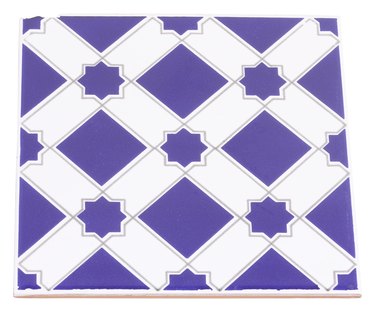
Ceramic tiles are heat-resistant, but not necessarily heat proof. With an almost limitless selection of color and designs, as well as the ability to withstand heat, ceramic tiles are a common choice for kitchen counter tops. However, you must take precautions if cooking around ceramic tile counter tops, because very hot items cam cause damage.
Ceramic Tile
Video of the Day
Ceramic tiles, created by firing white or red clay in a kiln, are usually glazed to create color and design. Similar to porcelain tiles but softer, ceramic tiles may be used on walls, floors and counter tops. For flooring, ceramic tiles suit residential use but are generally not tough enough for heavy, commercial traffic. Due to their porous nature, they are not suited for outdoor use in cold climates as they are not frost resistant. Ceramic tile is more likely to chip than porcelain tile, a consideration if using it for counter tops.
Video of the Day
Finishes
Besides virtually any color you can imagine, ceramic tiles also come in various finishes and designs. You can choose from a subdued matte finish, a very shiny high gloss, or a duraglaze finish which resembles two finish layers. For kitchen use, a high gloss may be suitable for walls but scratches easily, so it is not the best choice for counter tops.
Heat
Ceramic tile can crack if constantly exposed to different temperatures. Cracks may appear in ceramic tile counter tops with prolonged exposure to high heat. To prevent this occurrence, do not put hot pots and pans or heated appliances on the counter top. Because they are formed by high heat, additional exposure to extreme heat also alters them. Use trivets or similar heat protection pads to protect ceramic tile counter tops from hot objects, so there is no actual contact between the tile and heated item.
Discoloration
Constant changes in temperature may also cause discoloration of ceramic tiles. As a precaution, use a grout sealer on a new ceramic tile counter top approximately one week after installation. You must wait until the new grout has "cured." Sealing helps reduce damage from hot elements placed on the counter top. If cracks appear in the tile, you will need to regrout. Regular regrouting maintains the ceramic tile and prevents cracking as well as discoloration.